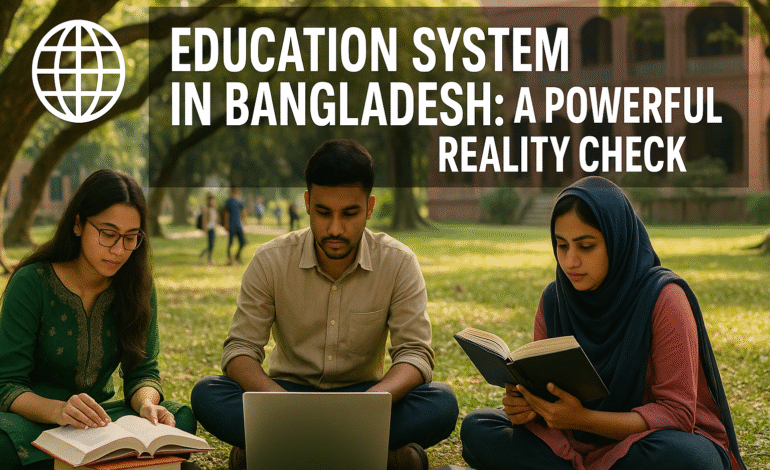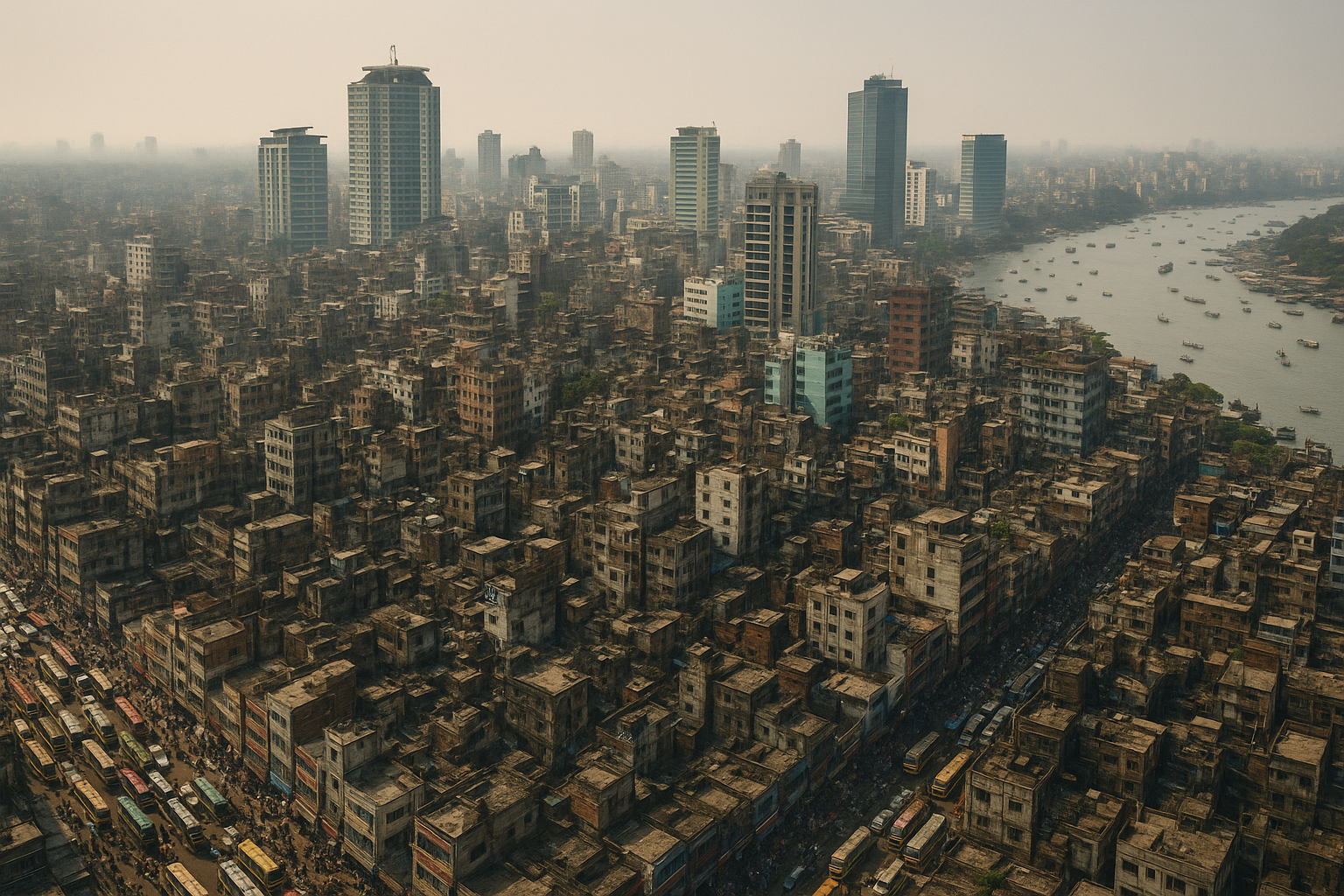Education System in Bangladesh: A Powerful Reality Check

A Harsh Reality of Bangladesh Education System
The education system in Bangladesh has made progress in access, enrollment, and literacy over the past decades. Primary education is almost universal, and literacy rates have improved from 35 percent in 1991 to over 76 percent in 2022, according to UNESCO. Yet, when it comes to global perception, the country’s education system and universities remain far behind.
Bangladeshi degrees are often not valued equally abroad, and local universities rarely make it into top global rankings. In 2024, no Bangladeshi university appeared in the top 400 of QS World University Rankings, and only a handful reached the 600–800 bracket. This situation reflects deep-rooted challenges in quality, infrastructure, and global competitiveness. Understanding these problems and their solutions is essential for Bangladesh’s future.
Why the Education System in Bangladesh Struggles Globally
The education system in Bangladesh faces multiple structural and cultural challenges that affect its global standing. While access to education has expanded, quality remains inconsistent. Let us explore the major causes in detail.
Outdated Curriculum and Teaching Methods
One of the biggest weaknesses of the education system in Bangladesh is its outdated curriculum. Many schools and universities still rely on rote learning rather than critical thinking. Students memorize textbooks instead of learning to analyze, create, and innovate.
Teaching methods also lag behind. Modern skills like coding, digital literacy, and research methodologies are rarely integrated into lessons. As a result, Bangladeshi graduates often lack the skills required in the global job market.
Solution: Modernize curricula with focus on critical thinking, problem-solving, and digital skills. Training teachers in modern pedagogy is equally vital. Partnerships with global universities can help in updating content and teaching practices.
Lack of Research and Innovation
Global university rankings heavily value research output, publications, and citations. Unfortunately, research culture is weak in the education system in Bangladesh. According to Scopus data, Bangladesh contributed less than 0.2 percent of global research publications in 2022.
Most universities focus on teaching rather than research. Laboratories, journals, and funding are limited. Faculty members often carry heavy teaching loads, leaving little time for research. Without publications in high-impact journals, universities cannot gain international recognition.
Solution: Increase government funding for research and encourage industry-university collaboration. Establish more research centers and provide incentives for publishing in reputed journals.
Limited Funding and Infrastructure
The education system in Bangladesh suffers from low funding. Bangladesh spends around 2 percent of its GDP on education, far below UNESCO’s recommended 4 to 6 percent. This limits resources for classrooms, libraries, technology, and teacher training.
Infrastructural gaps are visible everywhere. Many public universities face overcrowded classrooms, outdated labs, and weak internet facilities. Private universities often provide better facilities but charge higher fees, limiting access for many students.
Solution: Increase the education budget, with specific allocations for technology, libraries, and research infrastructure. Public-private partnerships can also improve facilities.
Brain Drain and Faculty Shortage
The education system in Bangladesh also suffers from brain drain. Many top students and scholars move abroad for higher studies and careers. According to UNESCO, over 60,000 Bangladeshi students studied abroad in 2022, one of the highest rates in South Asia.
Universities also face a shortage of qualified faculty. Many lecturers lack PhD-level training, and recruitment processes are often slow and politicized. Without skilled teachers and researchers, academic quality cannot improve.
Solution: Create attractive packages to retain talent. Offer scholarships and fellowships to encourage graduates to pursue PhDs abroad and return. Merit-based recruitment is essential for faculty quality.
Political Interference and Bureaucracy
Political influence weakens the education system in Bangladesh. University administration often suffers from politicization, where appointments are based on loyalty rather than merit. Student politics can also disrupt academic life, with strikes and clashes delaying semesters.
Bureaucracy adds another layer of inefficiency. Delayed approvals, corruption, and lack of autonomy slow down reforms. Global rankings favor universities with academic independence, which Bangladesh lacks.
Solution: Ensure university autonomy and depoliticize higher education governance. Transparency and accountability should be mandatory in administrative processes.
Weak English and Global Exposure
Global rankings also consider internationalization: the number of foreign students, faculty, and global collaborations. The education system in Bangladesh performs poorly here. Few foreign students enroll in Bangladeshi universities, and exchange programs are limited.
Another barrier is language. While English is widely taught, proficiency levels among graduates are often low. This limits their ability to publish globally, collaborate internationally, or compete in foreign job markets.
Solution: Strengthen English education and encourage global exchange programs. Attract foreign faculty and partnerships to raise international visibility.
Consequences of Low Rankings
The weak standing of the education system in Bangladesh has major consequences. Bangladeshi degrees often face less recognition abroad. Students applying for postgraduate programs in Europe or North America are sometimes asked to take extra tests or bridging courses.
Graduates also face disadvantages in the global job market. Employers prefer candidates from higher-ranked universities, leaving Bangladeshi applicants at a disadvantage. The country also loses foreign investment opportunities, as investors often look for strong local universities to partner with.
Solutions for Building a Stronger Education System in Bangladesh
The challenges facing the education system in Bangladesh are serious, but they are not impossible to solve. A combination of policy reform, investment, and cultural change can transform the sector.
- Increase Education Budget – Allocate at least 4 percent of GDP to education, focusing on higher education and research.
- Promote Research Culture – Establish research funds, encourage global collaborations, and link universities with industries.
- Modernize Curriculum – Update syllabi with global standards, digital skills, and practical learning.
- Teacher Training – Provide advanced training and international exposure for faculty members.
- University Autonomy – Depoliticize administration and allow universities to make academic decisions independently.
- Global Partnerships – Build exchange programs, attract foreign faculty, and join global networks.
- Technology Integration – Invest in online learning, smart classrooms, and high-speed internet for all campuses.
- Encourage Return of Scholars – Provide incentives for Bangladeshi academics abroad to return and contribute.
The education system in Bangladesh is at a crossroads. It has expanded access, improved literacy, and built a base of skilled graduates. Yet, global recognition remains limited due to outdated curricula, weak research, underfunding, and governance issues.
To move forward, Bangladesh must treat education as a long-term investment rather than a short-term sector. Modernization, funding, research, and global collaboration are essential. If these steps are taken, Bangladeshi universities can rise in global rankings and graduates can thrive worldwide.
Education is not just about degrees. It is about building a nation’s future. For Bangladesh, reforming its education system is not an option. It is a necessity.







